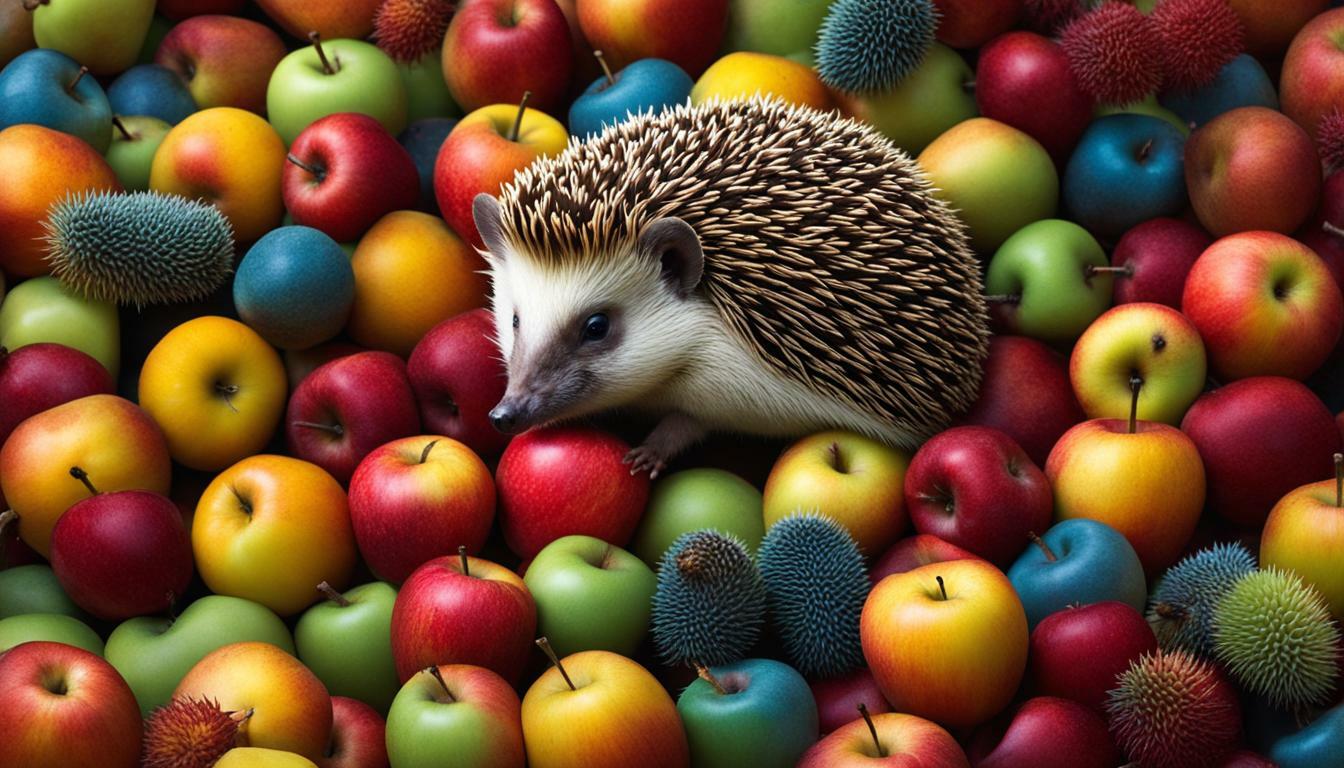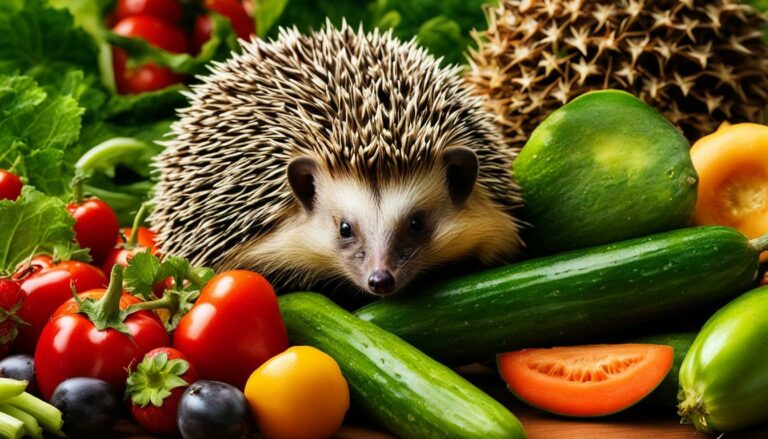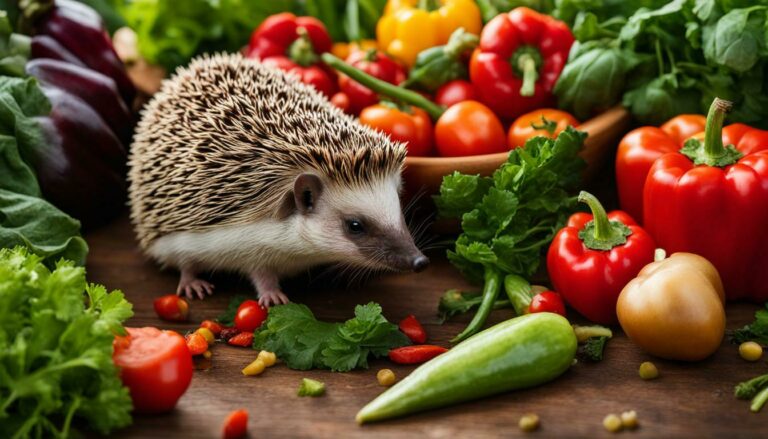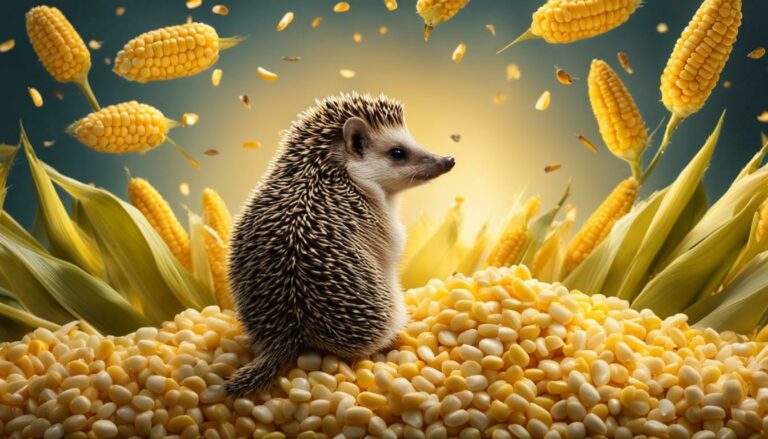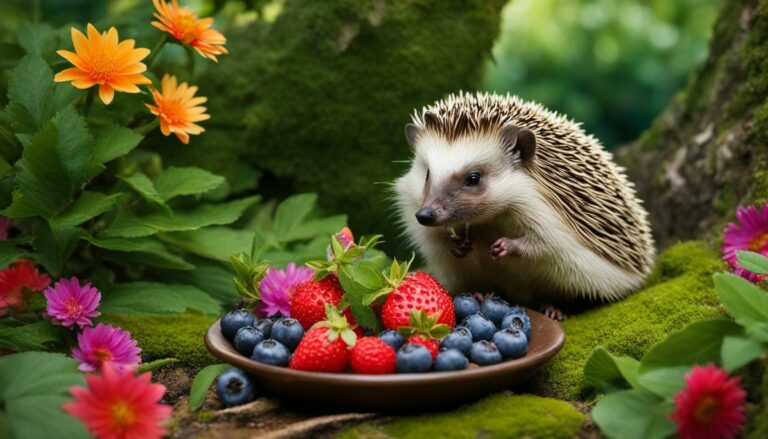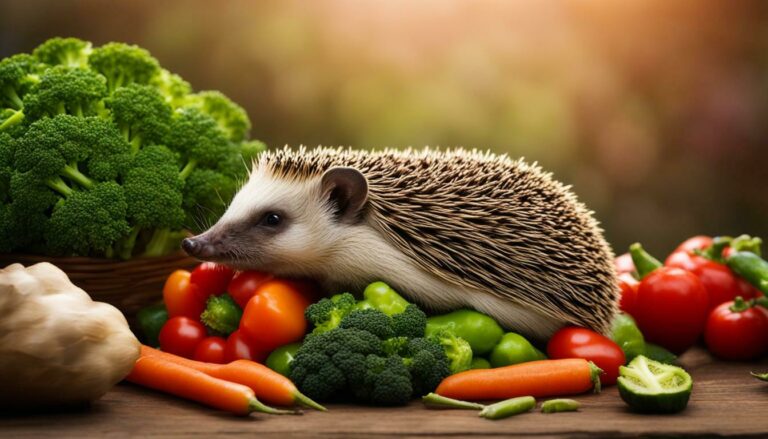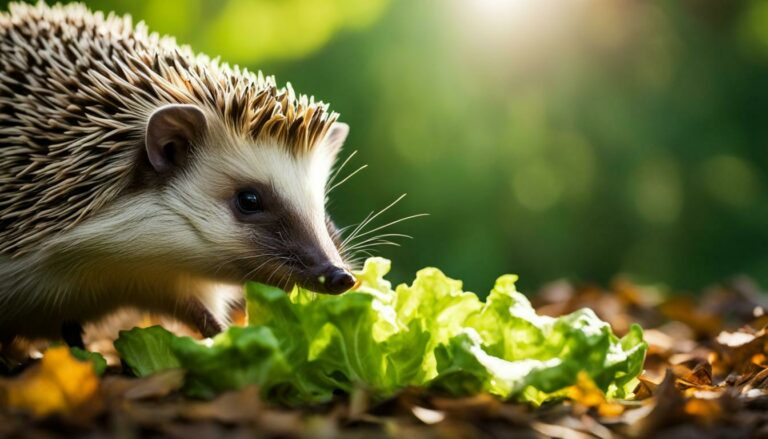Fact Check: Can Hedgehogs Eat Apples? | Comprehensive Guide
Many hedgehog owners wonder whether it is safe for their pets to consume apples, and we are here to provide a fact-based answer to the question: Can hedgehogs eat apples?
Key Takeaways:
- Hedgehogs can eat apples in moderation, as long as the seeds are not consumed.
- Apples lack the necessary protein content for a hedgehog’s diet, so they should be offered as an occasional treat.
- Hedgehogs are not able to properly digest fruits and vegetables, including apples, due to the lack of a cecum.
- Baby hedgehogs can start incorporating a small amount of apples into their diet after four weeks.
- The preference for different types of apples varies among hedgehogs.
- Apples are not harmful to hedgehogs, but they do not provide significant nutritional value.
- It is crucial to remove apple seeds and stalks before feeding them to hedgehogs.
- Apples should be served in small, mashed or chopped pieces to aid in digestion.
The Nutritional Value of Apples for Hedgehogs
Before determining whether hedgehogs can eat apples, it is important to examine the nutritional value of this fruit and assess its suitability for hedgehog diets. Apples are a common fruit that is enjoyed by many, and it’s natural to wonder if these juicy treats can be included in a hedgehog’s diet. Let’s take a closer look at the nutritional composition of apples and how they can contribute to a hedgehog’s overall health.
The following table provides an overview of the nutrients found in 100g of apples:
| Nutrient (unit) | Apple with skin | Apple without skin |
|---|---|---|
| Energy (kcal) | 48 | 58 |
| Carbohydrates (g) | 10.58 | 13.4 |
| Fat (g) | 0.05 | 0.1 |
| Protein (g) | 0 | 0 |
| Fiber (g) | 2.32 | 0.9 |
| Water (g) | 86.88 | 85.1 |
| Vitamin C (mg) | 4.8 | 8 |
| Calcium (mg) | 3 | 3.9 |
| Potassium (mg) | 61.6 | 109 |
From the nutritional table, it can be seen that apples are low in calories and fat, making them a light snack for hedgehogs. They contain a moderate amount of carbohydrates, primarily in the form of natural sugars. However, apples are essentially devoid of protein, which is a crucial component of a hedgehog’s diet. Hedgehogs require a diet that is rich in protein, ideally between 30% to 50% of their overall intake.
In terms of vitamins and minerals, apples provide a modest amount of vitamin C and small quantities of calcium and potassium. Vitamin C is important for hedgehog health as it plays a role in supporting their immune system. However, the calcium content in apples is relatively low, and hedgehogs require a balanced calcium to phosphorus ratio to maintain optimal bone health.
While apples can be enjoyed by hedgehogs as an occasional treat, it is essential to ensure a well-rounded diet that meets their specific nutritional requirements. Apples should not be the primary source of nutrition for hedgehogs, but rather a supplemental part of a varied diet that includes high-quality hedgehog food, insects, and other protein-rich foods.
Can Hedgehogs Safely Consume Apples?
Safety is a paramount concern when it comes to feeding hedgehogs, so let’s explore whether apples are safe for these adorable creatures to consume. Apples are a popular fruit enjoyed by many animals and humans alike. However, when it comes to hedgehogs, there are a few factors to consider.
Firstly, hedgehogs can indeed eat apples, but it is important to note that they should be given in moderation. Apples lack the high protein content that hedgehogs require in their diet, so they should not be the primary food. Instead, apples can be offered as an occasional treat after their regular meal. By doing so, hedgehogs won’t fill up on apples and neglect the more nutritious food they need.
It is safe for hedgehogs to consume apples, as long as certain precautions are taken. The apple seeds should be avoided, as they contain amygdalin, a cyanide compound that can be harmful in large quantities. Additionally, it is recommended to cut the apples into small pieces and remove the seeds before feeding them to hedgehogs. The apple skin, on the other hand, is safe for hedgehogs to eat and contains most of the nutrients.
| Nutrient (unit) | Apple with skin | Apple without skin |
|---|---|---|
| Weight standard (g) | 100 | 100 |
| Energy (kcal) | 48 | 58 |
| Carbohydrates (g) | 10.58 | 13.4 |
| Fat (g) | 0.05 | 0.1 |
| Protein (g) | 0 | 0 |
| Fiber (g) | 2.32 | 0.9 |
| Water (g) | 86.88 | 85.1 |
| Potassium (mg) | 61.6 | 109 |
While apples are not harmful to hedgehogs, it’s important to remember that they should not be the main component of a hedgehog’s diet. Hedgehogs require a diet rich in protein, and apples only provide a small amount of this essential nutrient. It is crucial to offer hedgehogs a varied and balanced diet that includes other foods that meet their dietary needs.
In conclusion, hedgehogs can safely consume apples as long as it is done in moderation and with proper preparation. Apples should be given as an occasional treat, and the seeds should be avoided. While apples can be enjoyed by hedgehogs, it is important to prioritize their dietary needs and provide a well-rounded diet that meets their nutritional requirements.
Moderation and Preparation: Feeding Apples to Hedgehogs
While apples can be safely consumed by hedgehogs, it is crucial to understand the significance of moderation and the proper way to prepare this fruit for their consumption. Hedgehogs require a high amount of protein in their diet, and apples lack sufficient protein to meet their dietary needs. Therefore, it is important to offer apples to hedgehogs in moderation and as a treat rather than a main component of their diet.
When feeding apples to hedgehogs, it is recommended to cut them into small pieces and remove the seeds, as apple seeds contain amygdalin, a type of cyanide that can be harmful to hedgehogs in large quantities. While the apple peel is safe for hedgehogs to consume, it is advisable to wash the apple thoroughly to remove any potential pesticides or chemicals before serving it to your pet.
One way to make apples more suitable for hedgehogs is by processing them into applesauce. By using a food processor, you can easily mash the apple into a sauce-like consistency, making it easier for hedgehogs to consume. The applesauce can also be pressed to remove excess liquid before feeding small portions to hedgehogs to avoid any potential stomach upset due to the acid in the juice.
Table: Nutritional Comparison of Apples with and without Skin (per 100g)
| Nutrient (unit) | Apple with skin | Apple without skin |
|---|---|---|
| Energy (kcal) | 48 | 58 |
| Carbohydrates (g) | 10.58 | 13.4 |
| Fat (g) | 0.05 | 0.1 |
| Protein (g) | 0 | 0 |
| Fiber (g) | 2.32 | 0.9 |
| Calcium (mg) | 3 | 3.9 |
| Phosphorus (mg) | 6.8 | 9.9 |
| Vitamin C (mg) | 4.8 | 8 |
While apples provide some nutritional benefits to hedgehogs, such as fiber and vitamin C, they should not be a major component of their diet due to the low protein content and unbalanced calcium to phosphorus ratio. To ensure a balanced and nutritious diet for your hedgehog, it is important to offer a variety of protein-rich foods and consult with a veterinarian or animal nutritionist for specific dietary recommendations.
Overall, apples can be safely incorporated into a hedgehog’s diet as an occasional treat, but they should not be the sole focus of their meals. By practicing moderation and proper preparation, you can provide your hedgehog with a diverse and nutritious diet that meets their specific dietary needs.
Apples and Hedgehog Dietary Needs
To ensure the overall health and well-being of hedgehogs, it is essential to evaluate whether apples fulfill their dietary needs and provide the necessary nutrients. While hedgehogs can safely consume apples, it’s important to understand that apples should only be offered in moderation and as part of a balanced diet.
When it comes to nutritional value, apples are low in protein, which is a crucial component of a hedgehog’s diet. Hedgehogs require between 30% to 50% protein in their diet to support their growth and overall health. Compared to the protein requirement, apples only contain about 0.3% protein, which is significantly lower. Therefore, it’s important to limit the amount of apple given to the hedgehog and ensure they receive protein from other sources, such as live insects or specially formulated hedgehog food.
On the other hand, apples do provide some beneficial nutrients for hedgehogs. They are a good source of water, fiber, and various vitamins, including vitamin C. However, it’s important to note that apples have an unbalanced calcium to phosphorus ratio, with more phosphorus than calcium. This can potentially lead to an imbalance in the hedgehog’s diet if apples are consumed in excessive amounts.
| Nutrient (unit) | Apple with skin | Apple without skin |
|---|---|---|
| Protein (g) | 0 | 0 |
| Fiber (g) | 2.32 | 0.9 |
| Calcium (mg) | 3 | 3.9 |
| Phosphorus (mg) | 6.8 | 9.9 |
| Vitamin C (mg) | 4.8 | 8 |
When feeding apples to hedgehogs, it’s important to follow some best practices to ensure their safety and well-being. Apples should be cut into small, bite-sized pieces to prevent choking hazards. It’s recommended to remove the seeds, as they contain amygdalin, a type of cyanide that can be harmful if consumed in large quantities. The apple skin can be left intact, as it contains the most nutrients, but it’s crucial to ensure the apple is thoroughly cleaned before feeding it to the hedgehog to remove any chemicals or pesticides.
In conclusion, while hedgehogs can eat apples, they should be offered in moderation and as part of a varied diet that meets their nutritional needs. Apples can provide some beneficial nutrients but should not be relied upon as the main source of nutrition. It’s always best to consult with a veterinarian or an experienced hedgehog owner to ensure the hedgehog’s diet is well-balanced and meets their specific dietary requirements.
Best Practices for Feeding Apples to Hedgehogs
Feeding apples to hedgehogs can be a rewarding experience, but it is important to follow best practices to ensure their safety and well-being. While hedgehogs can consume apples, they should be given in moderation and prepared in a way that is suitable for their dietary needs.
1. Moderation is Key
Hedgehogs require a diet that is high in protein, and apples are low in protein content. Therefore, it is important to limit the amount of apple given to hedgehogs. Apples should be offered as an occasional treat in small pieces, rather than as a staple food. This will ensure that hedgehogs are receiving the necessary nutrients from their main diet while still enjoying the taste of apples.
2. Proper Preparation
When feeding apples to hedgehogs, it is best to cut them into small pieces and remove the seeds. Apple seeds contain amygdalin, a type of cyanide that can be harmful to hedgehogs in large quantities. Additionally, it is advisable to clean the apple before feeding it to the hedgehog to remove any chemicals or pesticides. While the skin of the apple can be consumed by hedgehogs, it is important to ensure that it is thoroughly cleaned to avoid any potential contamination.
3. Introduce Slowly
If you are introducing apples to your hedgehog’s diet for the first time, it is recommended to do so gradually. Start by offering a small piece of apple and observe how your hedgehog reacts to it. If there are no adverse effects, such as diarrhea or upset stomach, you can gradually increase the amount of apple given. This will allow your hedgehog’s digestive system to adjust to the new food.
4. Consider the Nutritional Balance
While hedgehogs can enjoy the taste of apples, it is important to remember that apples should not be a substitute for their main diet. Hedgehogs require a diet that is high in protein, and apples do not provide sufficient levels of protein. It is essential to ensure that your hedgehog’s diet includes other protein-rich foods, such as insects or specially formulated hedgehog food, to meet their nutritional needs.
| Nutrient (unit) | Apple with skin | Apple without skin |
|---|---|---|
| Energy (kcal) | 48 | 58 |
| Protein (g) | 0 | 0 |
| Fiber (g) | 2.32 | 0.9 |
| Calcium (mg) | 3 | 3.9 |
| Phosphorus (mg) | 6.8 | 9.9 |
| Vitamin C (mg) | 4.8 | 8 |
Source: Nutritional Information (Apples)
In conclusion, while hedgehogs can safely consume apples, it is important to feed them in moderation and take into account their nutritional needs. By following these best practices, you can ensure that your hedgehog enjoys the occasional apple treat while maintaining a balanced and healthy diet.
Conclusion
In conclusion, hedgehogs can safely eat apples as long as certain precautions are taken, such as feeding them in moderation and preparing them appropriately. Apples can be a tasty treat for hedgehogs, but they should not make up a large portion of their diet due to their high sugar content. Hedgehogs require a diet that is high in protein, so it is important to ensure that they are getting the necessary nutrients from other sources.
When feeding apples to hedgehogs, it is important to remove the seeds, as they can be harmful due to the presence of cyanide. The skin of the apple is safe for hedgehogs to consume and contains many of the nutrients found in the fruit. However, it is recommended to clean the apple before feeding it to the hedgehog to remove any chemicals it may have been exposed to.
While hedgehogs can eat raw apples, it is recommended to cut them into small pieces or mash them into applesauce to make it easier for hedgehogs to eat. Cooked apples can also be fed to hedgehogs, but it is important to avoid adding any spices or oils. Apples should be offered as an occasional treat and not as a staple food in a hedgehog’s diet.
Overall, while apples are not a necessary part of a hedgehog’s diet, they can be enjoyed in moderation. It is important to prioritize foods that are high in protein and meet the nutritional needs of hedgehogs to ensure their overall health and well-being.
FAQ
Q: Can hedgehogs eat apples?
A: Yes, hedgehogs can eat apples in moderation. However, it is important to remove the seeds and offer small pieces. Apples should be given as a treat and not a staple in their diet.
Q: Can hedgehogs eat applesauce?
A: Yes, hedgehogs can eat unsweetened or organic applesauce in moderation. Avoid applesauce with added preservatives or sugar.
Q: Can hedgehogs eat baby food?
A: Yes, hedgehogs can eat baby food, but it should be organic and free of dairy products. Avoid fish-flavored baby food and ensure there are no added seasonings.
Q: Can hedgehogs eat bacon?
A: No, hedgehogs should not be fed bacon due to its high sodium and preservative content. It is also difficult for hedgehogs to chew.
Q: Can hedgehogs eat boiled eggs?
A: Yes, hedgehogs can eat boiled eggs without seasoning or oil. Serve only the egg white in small pieces. Limit the frequency to once a week due to cholesterol content.
Q: Can hedgehogs eat bread?
A: No, hedgehogs should not be fed bread as it lacks nutritional value and can cause indigestion.
Q: Can hedgehogs eat cheese?
A: No, hedgehogs are generally lactose intolerant and should not be fed cheese. However, yogurt and cottage cheese can be given in small amounts.
Q: Can hedgehogs eat chicken?
A: Yes, hedgehogs can eat cooked chicken without seasoning or oil. Chop or slice into small pieces for easy consumption.
Q: Can hedgehogs eat corn?
A: No, hedgehogs should not be fed corn as it can cause indigestion. Corn does not provide significant nutritional value for hedgehogs.
Q: Can hedgehogs eat eggs?
A: Yes, hedgehogs can eat cooked eggs without seasoning or oil. Hard-boiled or scrambled eggs are suitable.
Q: Can hedgehogs eat fish?
A: No, hedgehogs should not be fed fish as it is not part of their natural diet. Freshness and lack of seasoning are crucial if offering fish, but it is generally not recommended.
Q: Can hedgehogs eat grass?
A: No, hedgehogs should not eat grass due to potential exposure to pesticides or fertilizers. Hedgehogs are primarily insectivores and do not rely on vegetables for their diet.
Q: Can hedgehogs eat ham?
A: Yes, hedgehogs can eat ham without seasoning or oil. Boil the ham until tender and cut into bite-sized pieces.
Q: Can hedgehogs eat nuts?
A: No, hedgehogs should not be fed nuts as they are difficult to digest. Nuts should only be offered as an occasional treat.
Q: Can hedgehogs eat peanut butter?
A: No, hedgehogs should not be fed peanut butter as it is not part of their natural diet. Stick to foods that meet their nutritional needs.
